When the pandemic all but canceled new movies in 2020, the following year seemed poised for a thrilling comeback, with a huge backlog of exciting films waiting to see the light of day. And despite the virus’ continued existence, movie theaters did remain open in most places throughout 2021, offering a reasonable amount of promising titles as the year went on.
The problem is that almost none of them were memorable. Considering how often I went to the theater last year, especially in the last three months, it’s remarkable how few of those movies left even a decent impression on me — and the streaming options weren’t much better. While it certainly wasn’t as dismal of a year as 2020, when the only film I saw in a theater was Christopher Nolan’s massively disappointing Tenet, 2021 featured far more letdowns than enjoyable experiences as a whole.
However, I don’t want to lose my faith in cinema, especially at a time when the industry is more challenged than ever. So in the spirit of optimism, I’ve waded through all the mediocrity to compile my list of the ten best films of 2021. And even though it’s a weaker list than most years, all of these movies are absolutely worth watching. Here’s hoping that 2022 will be a better year for film, and for the world in general.
10. Belfast (Kenneth Branagh)

A semi-autobiographical story about Branagh’s time growing up in Belfast, smack in the middle of violent conflict between the Catholics and the Protestants, Belfast is a simple but endearing look at a messy time and place in history through the innocent eyes of a child.
The cast is uniformly excellent with Ciaran Hinds, Jamie Dornan, Caitriona Balfe, Judi Dench, and newcomer Jude Hill all delivering nomination-worthy performances. The black-and-white cinematography with occasional splashes of color also works beautifully, lending the film a nostalgic quality that fits the aesthetic of childhood.
The script feels a bit light at times, leaving some supporting characters underdeveloped and not exploring the Catholics vs. Protestants conflict in as much detail as it could have. But ultimately, this is the story of a boy growing up and being forced to reckon with the possibility of leaving his childhood home, a theme that can resonate with almost anyone.
9. Malignant (James Wan)
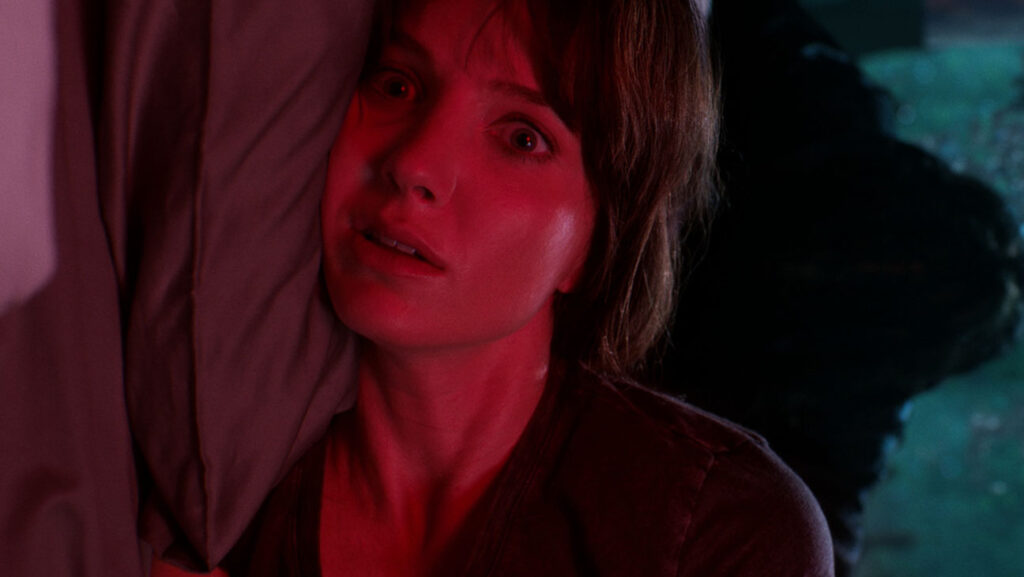
One of the most purely entertaining films I saw last year, Malignant is a wild roller coaster ride of a horror movie with one of the most insane plot twists I’ve ever seen. It may or may not entirely make sense and you have to completely suspend your sense of disbelief, but if you’re able to do that, the film leaves a memorable impression. If nothing else, it’s never boring and will keep you guessing until all is revealed.
I don’t want to spoil any elements of the plot, so I won’t go into detail about the story. All I’ll say is that it involves a woman who’s tormented by horrifying visions of people being murdered and slowly realizes that these visions are happening in real life. It’s best not to know any more than that going into the movie.
The bottom line is this: if you prefer horror films that are more realistic and cerebral, you may want to avoid this one. But if you’re up for a blood-soaked, batshit-crazy experience, Malignant is worth a watch.
8. In The Earth (Ben Wheatley)
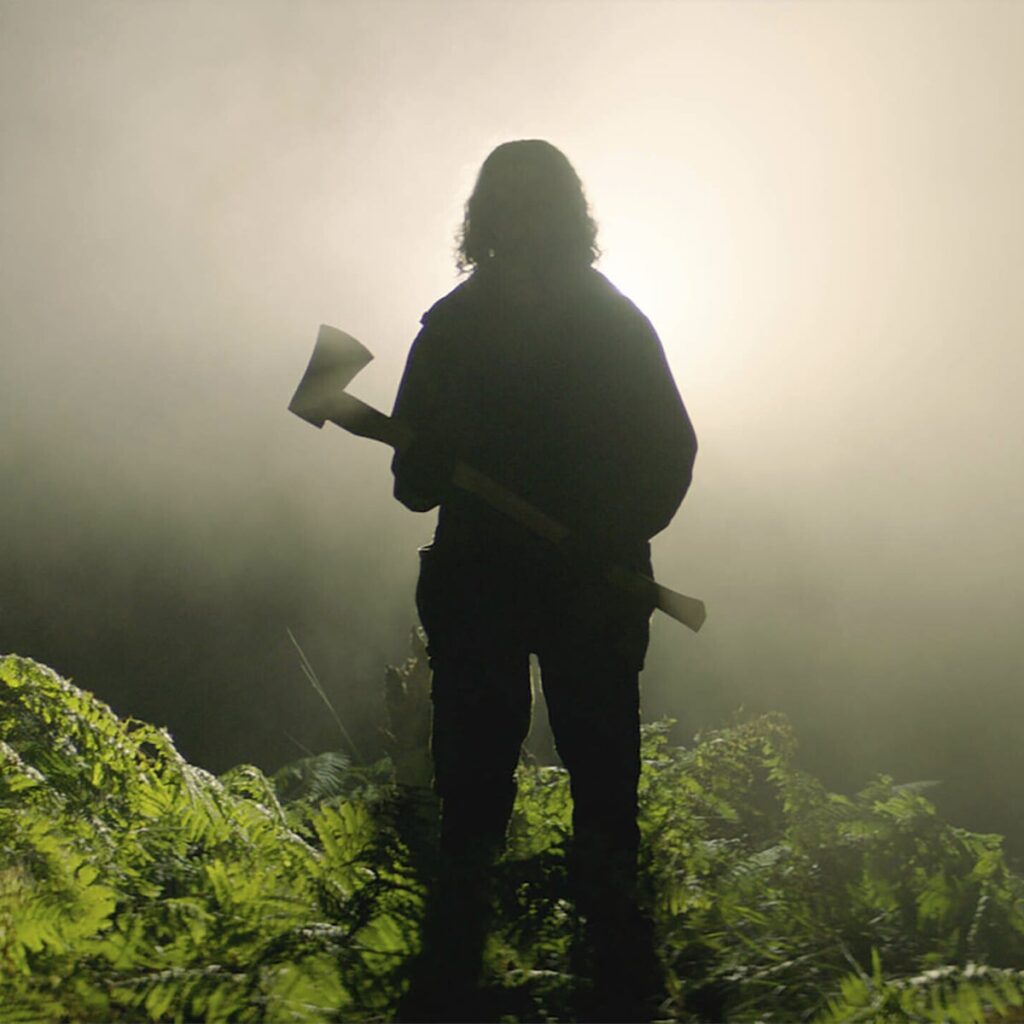
Made on a micro-budget with minimal cast and crew in the heart of the pandemic, Ben Wheatley’s In The Earth is a lesson to aspiring filmmakers on how to get the most out of limited resources. While it doesn’t reach the heights of his best works, A Field in England and Kill List, it’s more interesting and memorable than his last few efforts with a haunting quality that lingers in your mind.
The story focuses on two scientists in the midst of a pandemic who are sent to retrieve an important researcher from the heart of the forest. Naturally, complications develop and things get very weird, as the primal forces of nature exert their influence in mysterious and terrifying ways.
In The Earth is definitely a case of style over substance. The script provides some interesting themes and ideas, but leaves most of them unresolved or underdeveloped, and the characters aren’t particularly memorable either. However, the film is oddly mesmerizing even when little is happening, thanks to striking cinematography and a masterful score by Clint Mansell. When the movie veers into psychedelic territory towards the end, it achieves moments of spine-chilling transcendence.
7. Bad Trip (Kitao Sakurai)
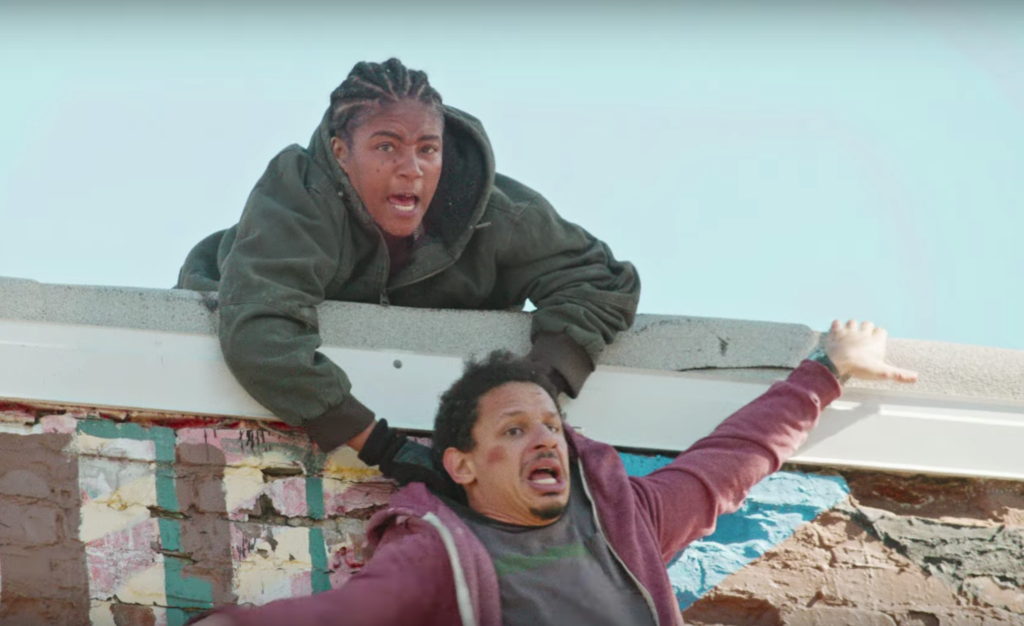
He’s not necessarily a household name, but at least within a certain demographic, Eric Andre is one of the most unique and lovable figures in comedy. Primarily known for his wild late-night talk show parody on Adult Swim, The Eric Andre Show, Andre is a ruthless prankster and extreme performance artist who’s always pushing boundaries.
Bad Trip, a buddy comedy that incorporates lots of hidden camera pranks, is relatively tame compared to his show, but feels like the perfect vehicle to package Andre’s shtick for a more mainstream audience. The film is set up as a generic road trip/romantic comedy, with Chris (Andre) and his best friend (Lil Rel Howery) setting out for New York to pursue the girl of his dreams. Meanwhile, they’re pursued by Bud’s dangerous convict sister, played by a nearly unrecognizable Tiffany Haddish in a scene-stealing performance.
While I’m generally not a fan of the hidden-camera prank genre, Andre elevates messing with people to a higher art form. His stunts are so bold and outrageous, and performed with such apparent sincerity, that it’s easy to see why he’s able to pull so many unsuspecting bystanders into his whirlwind of chaos. Best of all, Andre doesn’t settle for the easy route of just pissing people off – in many cases, he’s actually bringing strangers together, thrusting them into the middle of beyond-uncomfortable situations that they’ll never forget.
As a result, Bad Trip is not only the funniest movie of the year by a long shot, but it’s also an oddly optimistic film that shows people are often much more caring and empathetic than we imagine them to be.
6. The Father (Florian Zeller)
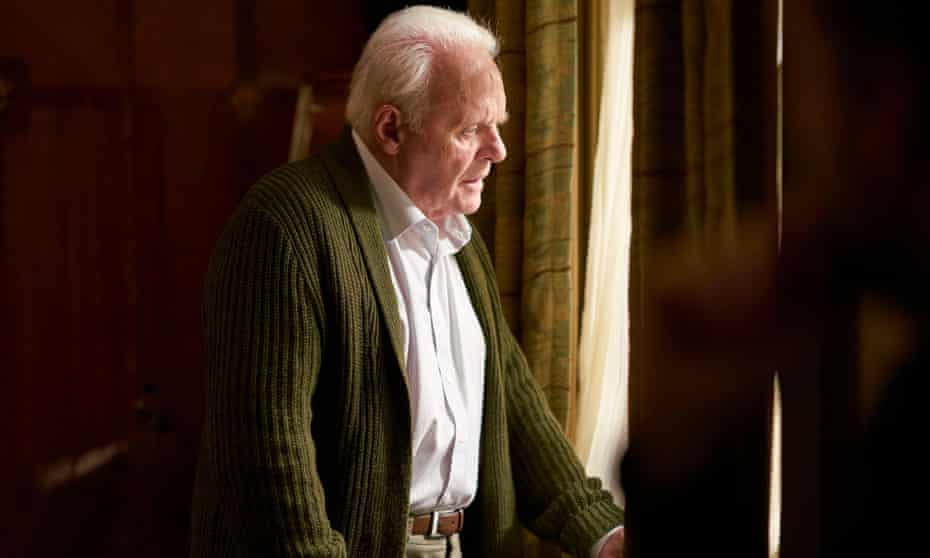
Because of the way that COVID-19 screwed up the timeline for last year’s Academy Awards, Anthony Hopkins has already won an Oscar for his performance in this film, and deservedly so. But even if the Academy wants to call The Father a 2020 film, it wasn’t released until February of last year, which means it’s a 2021 film by my definition. And considering the general lack of competition, it had no problem staying on my list all year long.
Based on a play, The Father tells the story of an elderly man who’s losing his mind to Alzheimer’s disease, suffering from increasing confusion, hallucinations, and paranoia. The film is presented from his perspective, so the viewer is forced to suffer through all the confusion right alongside the main character, not knowing for sure which parts of the story are real or merely delusions. It’s an interesting technique that makes the film far more interesting than it otherwise would’ve been.
Overall, there isn’t much to The Father – it’s a small, simple film and most viewers will understand what it wants to communicate without even watching it. It’s also extremely depressing, especially if you have relatives who suffer from Alzheimer’s, as I do. Having said that, it’s worth a watch for Hopkins’ brilliant performance, and for the lingering emotional impact it leaves by forcing you to consider what it would feel like to lose control of your mind.
5. Nightmare Alley (Guillermo Del Toro)
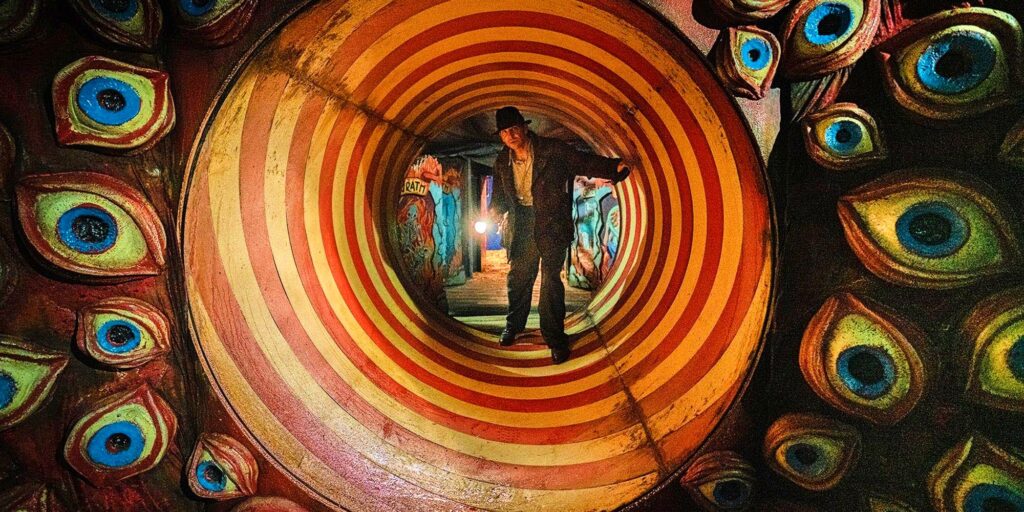
At this point, I’ve accepted that Guillermo Del Toro will likely never again reach the heights of his 2006 masterpiece, Pan’s Labyrinth. However, he remains a talented filmmaker with a distinctive style and Nightmare Alley is as good, if not better, than anything else in his filmography.
A remake of a 1940s noir film, the story focuses on Stan Carlisle (Bradley Cooper), a lowlife who stumbles into a job at a traveling carnival and uses the tricks he learns from a clairvoyant there to become a lucrative conman. Before long, he’s enlisting the help of a mysterious therapist (Cate Blanchett) to expand the scope of his con and things get increasingly dangerous for everyone involved.
One of the most beautifully-shot and lushly designed films of the year, Nightmare Alley leaves a strong visual impression and does an outstanding job of maintaining its icy mood. The cast is also excellent from top to bottom, with Cooper, Blanchett, and Willem Dafoe leaving the strongest impressions. The pacing is a bit slow and a few elements of the story feel underdeveloped, but it’s an engrossing experience that comes to an appropriately dark and satisfying ending.
4. The Green Knight (David Lowery)
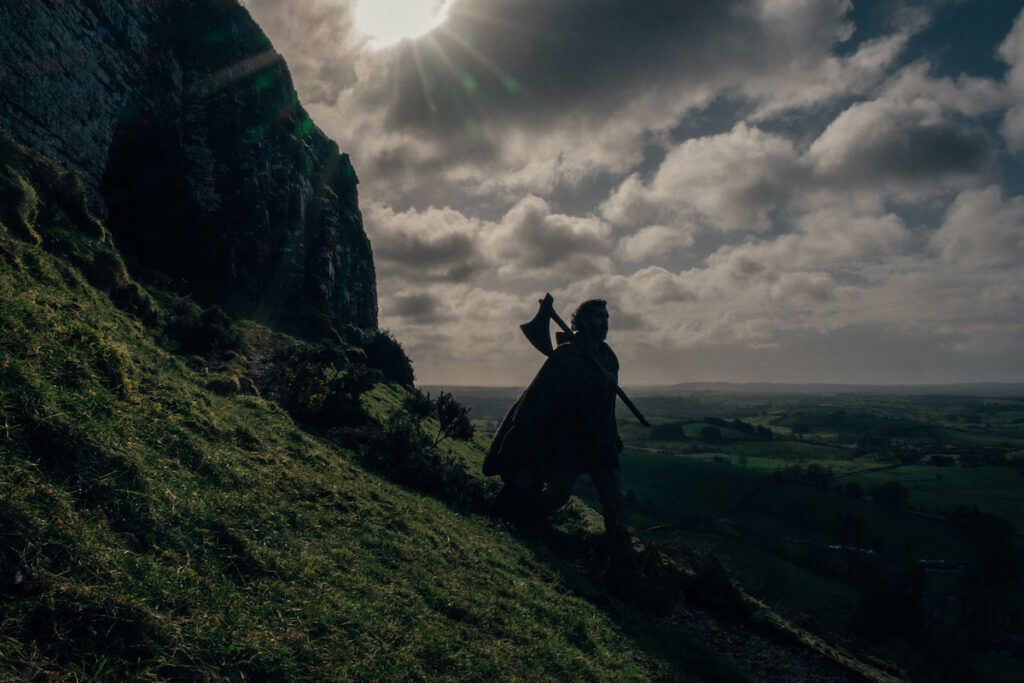
I’m not a fan at all of David Lowery’s previous films, so I went into The Green Knight feeling skeptical. I was both surprised and delighted to find myself immediately immersed, transported into a medieval fairy tale unlike anything I’ve seen before.
Based on a famous legend, The Green Knight tells the story of Sir Gawain (Dev Patel), an underachiever nephew of King Arthur’s who accepts a dangerous challenge to risk his life and confront the mysterious Green Knight in an effort to gain respect. Most of the film focuses on his strange and surreal journey through the forest, with some of his misadventures along the way including a costly run-in with a gang of thieves and a stop to help a woman retrieve her missing head from a pond.
If this all sounds like some sort of mythological vision quest, you wouldn’t be wrong. Audience members who are expecting thrilling sword fights and fire-breathing dragons will be sorely disappointed. The Green Knight is a slow and contemplative film, stuffed with literary symbolism and ambiguities. In fact, there are a few moments that I’m still scratching my head about. But I was never bored for a second, as the film’s gorgeous cinematography and enigmatic storytelling kept my eyes glued to the screen.
3. Last Night in Soho (Edgar Wright)
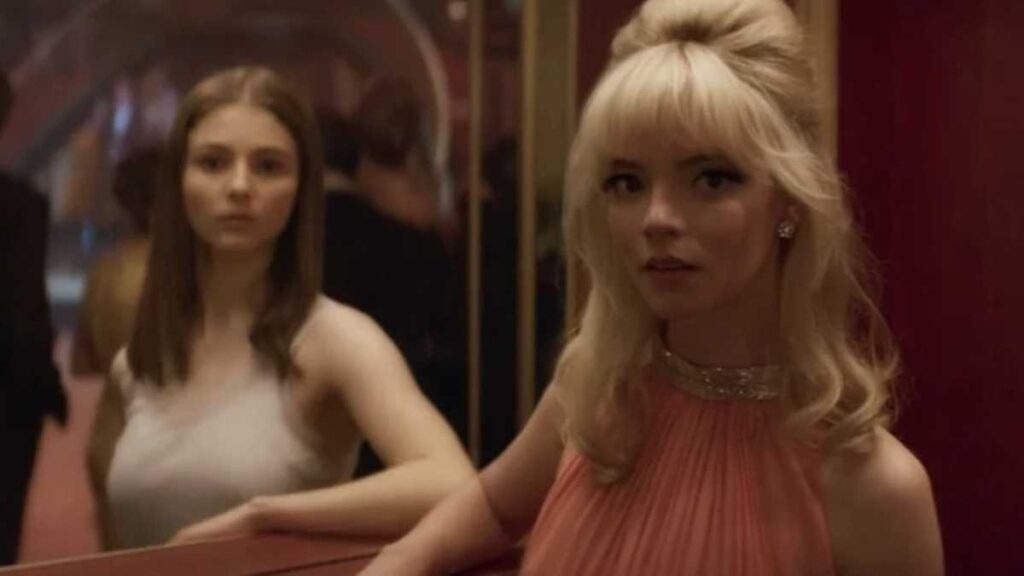
I’m really surprised this movie wasn’t able to generate any hype at the box office. A dark, stylish, and fast-paced thrill ride with a highly original concept, Last Night in Soho deserves far more attention and accolades than it’s received thus far. When you take into account the success of Wright’s previous films (Shaun of the Dead, Hot Fuzz, Baby Driver), it’s truly baffling that this movie flew under the radar.
The plot features several twists and turns that are best left unspoiled, so don’t read too much about the movie in advance. All you need to know is that it’s about an aspiring fashion student in London (Thomasin Mackenzie) who finds herself inexplicably transported back in time to the 1960s. While there, she discovers a mysterious connection between herself and a lounge singer (Anya Taylor-Joy), with consequences that begin to echo into the present.
It’s a killer concept, a story that I actually hadn’t seen before and couldn’t guess where it was going. The material is brought to life by vibrant cinematography, stellar production design, rapid-fire editing, and an excellent soundtrack. Mackenzie and Taylor-Joy are both perfectly cast, with strong support from veteran British character actors Diana Rigg, Rita Tushingham, and Terence Stamp. All of these elements combine to make Last Night in Soho a blast, easily the most fun experience I’ve had in a theater since the start of the pandemic.
2. Saint Maud (Rose Glass)
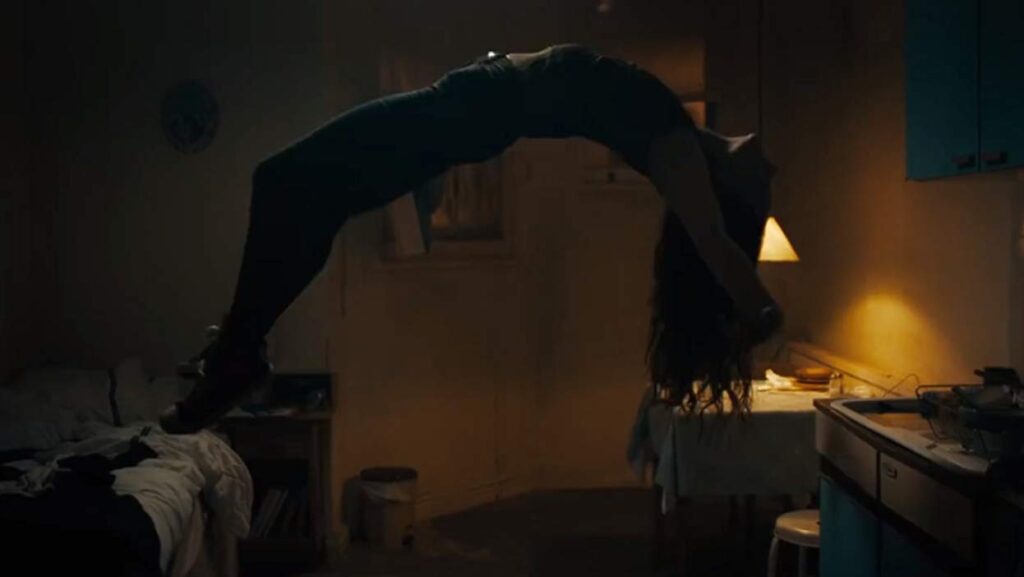
The first film from British writer/director Rose Glass, Saint Maud is one of the most impressive and unforgettable cinematic debuts in recent memory. Beautifully shot and breathlessly paced, backed by a pulse-pounding score and a clever script that expertly balances classic horror tropes with weighty religious themes, Glass’ vision arrives on screen fully formed.
The story focuses on Maud (Morfydd Clark), a nurse who quits her job at the hospital after experiencing a horrific trauma and subsequent religious epiphany. This leads to her taking a path of extreme devotion, shunning physical pleasures and companionship to get closer to God, whom she speaks to directly. In an effort to redeem her past sins, she takes a job as a private nurse and begins caring for a dying woman named Amanda (a terrific Jennifer Ehle), who doesn’t believe in God and fears that nothing waits for her on the other side of death.
Believing that this is God’s plan for her, Maud becomes singularly focused and determined to save Amanda’s soul from damnation. Amanda seems appreciative at first, as the two women appear to experience a sort of religious ecstasy together – but things grow increasingly tense and complicated as Maud’s initially pure intentions morph into an all-consuming obsession.
Clark gives a riveting performance as Maud, evoking sympathy and shudders in equal measure. She’s a tragic character who we’re never quite sure whether to feel sorry for or afraid of, maybe both. Her visions are presented with such clarity that they’ll have you questioning if she really can talk to God, no matter your personal beliefs. This disquieting ambiguity is expertly maintained all the way through the shocking, edge-of-your-seat climax, until the deeply unsettling final frame snaps reality all too clearly into focus, leaving the viewer shaken and speechless.
1. Titane (Julia Ducournau)
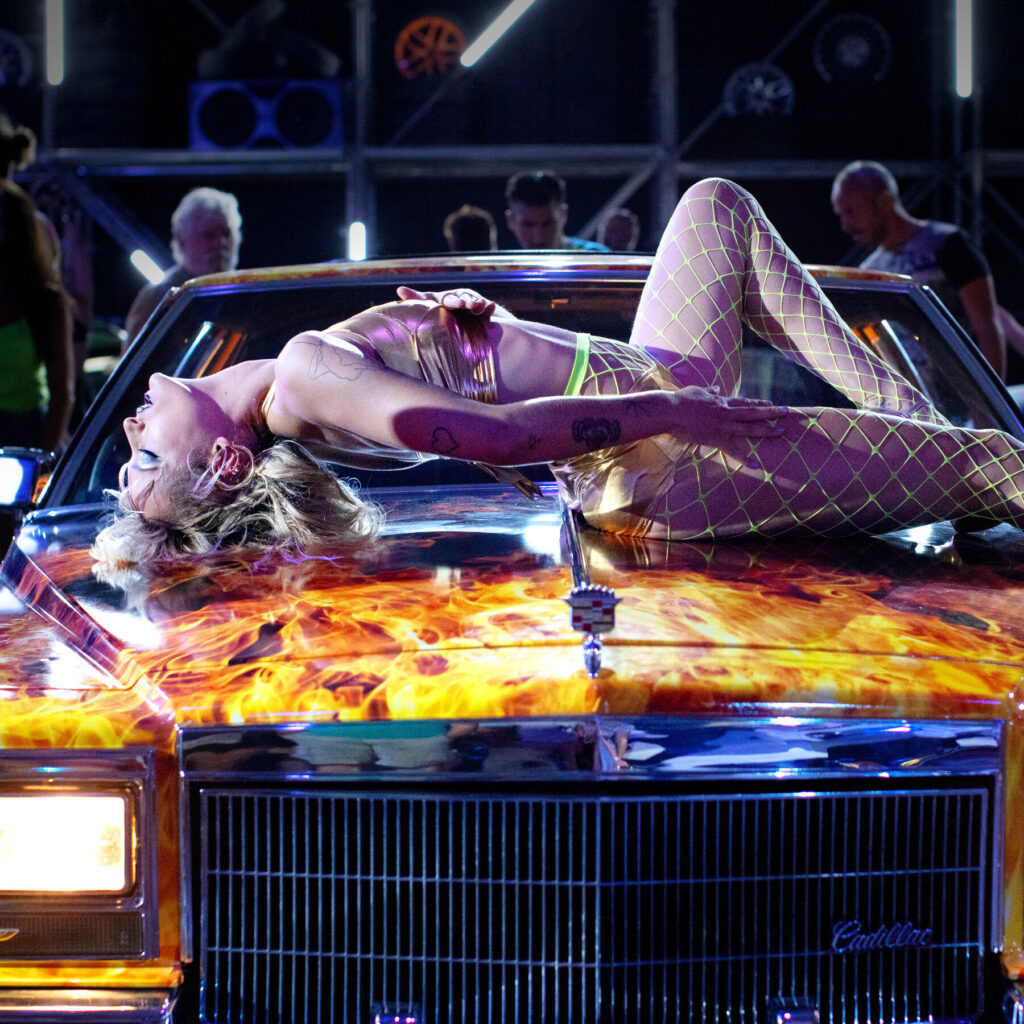
With Titane, Julia Ducournau has asserted herself as one of the most exciting emerging filmmakers in the world, more than following through on the promise shown in her unnerving 2016 debut Raw. That memorable film told the story of a young vegetarian woman who develops a craving for human flesh – yet, amazingly, Titane is an even more original, provocative, and demented vision.
The plot is difficult to summarize and some parts are better left as a surprise. All I knew going in was that it’s about a violent woman who develops an erotic obsession with cars after an accident as a child. That’s really all you need to know and if you’re not even remotely intrigued by that description, it’s probably not worth digging in deeper. However, it’s worth noting that beyond the graphic violence and sexual content, this movie does offer some fascinating ideas about identity, gender, sexuality, and the importance of family (biological or otherwise).
Titane is the kind of film that will have many audience members sprinting for the exits by the fifteen-minute mark, and understandably so. It’s unrelentingly dark, twisted, disturbing, and just downright bizarre from the opening frame. It’s also, in my opinion, the best and most original film of 2021. I was riveted from beginning to end, at times literally gaping at the screen in reaction to what was happening.
Films this wildly unrestrained just don’t come around often, and while they’re certainly not for everyone, I think it’s important to embrace them. In a literal sense, I couldn’t always make sense of what was happening during Titane, but I didn’t care because I was too busy being swept away by Ducournau’s singular vision. In a year that was light on major contenders, Titane stands tall above the crowd – perversely erotic, shockingly violent, never predictable, and ultimately unforgettable.
